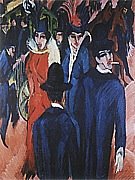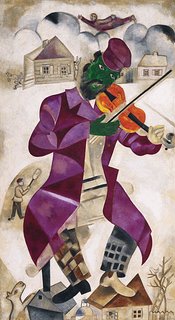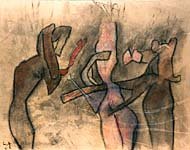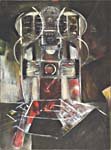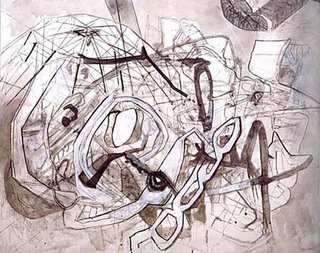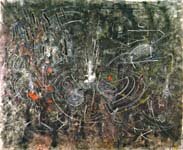
(Roberto Matta, "untitled" - 1961)
A Nigerian ex-boxer named Godswill swings the door open and pushes me into the smoke filled room.
“I found him,” he announces to the two men waiting inside.
I’m still slow coming down from a routine mescaline trip. Godswill came pounding at my door not ten minutes after the snow-white powder had melted into my bloodstream.
Godswill hangs his coat and sits down at a typewriter placed oddly in the centre of the room. He lites a camel cigarette as I stand beside him and suck in that delicious second hand smoke. All the pleasure with none of the guilt. He cracks his knuckles and flexes his fingers as he poises over the keys of a vintage sterling silver. He adjusts the blank sheet of paper and begins to type. Louder than any typewriter I’ve ever heard, than anything I've ever heard, the racket penetrates the cloudy silence of the night.
"
Thursday, February 16th, 11:42 pm," it thunders. Godswill pulls aggresively on the metal latch and descends two lines.
"
The Thursday Thief," he types.
I guess that’s me.
The other two men in the room I know only by reputation. Jonathan Court. Better known as Pinball Johnny, a seasoned street boxer who also runs his own gambling ring. He’d accumulated a small fortune by betting on himself. The other man is The Shuffler, his number two, handles the accounts, orders the women, that sort of thing. He’s a long, lean, lanky man who always wears pinstripes.
The Shuffler hands Pinball a casino crisp deck of cards.
“So you believe in magic?” The Shuffler asks me.
“Do you know who I am, motherfucker?” I spit out. It’s the white powder talking; they know exactly who I am, and the limits of my influence.
Our dialogue echoes like a sledgehammer as Godswill clobbers away.
... tap tap tap tap ding.... tap tap tap tap ding.There’s a slight pause as Pinball Johnny takes stock of my ballsiness. Silence regains her tenuous hold on the night. Melted snow trickles through my system. I’m looking at myself through the eyes of these three men. Awfully calm and collected. Faded green polo-shirt. Neat yet non-chalant. And not a single hint of the past. A young man fully resigned to the seductive spell of the present. Godswill cracks his neck violently and re-assaults the keys. I jump back into my own skin.
The Shuffler hunches over and writes something on a pad of paper. Pinball Johnny reads and his eyeballs dart in my direction. The two of them peek at their watches like synchronized swimmers. The Shuffler nods and slides back to his upright position.
“It’s now 11:55 pm, Thursday night. ” The Shuffler says. “Time to get started.” I suddeny realize I’ve got no chance.
Godswill ashes his cigarette and gets back to work.
... tap tap tap tap tap ding.“You see, kid,” The Shuffler begins to explain in the full splendour of metallic surround sound. “It’s always worked a certain way in this town. And then you came along and fucked it all up. Now, that’s not necessarily a bad thing. But it makes us wonder. Forces us to find answers to a few questions.”
... tap tap tap tap ding.“The cards are clean, the odds are even, and the stakes are real. Those are the basic pre-requisites for Mr. Court’s talent to take full effect, and we assume it’s the same with you, unless you're cheating. So we’re gonna conduct a little test. High-card, two out of three. You against Mr. Court. You win, you walk home. You lose, you don’t. Care to draw first or second?”
... tap tap tap tap tap ding.“First,” I answer.
The Shuffler strolls on over and holds the deck out in front of me. I pull the top layer from that virgin deck of cards. Jack of Hearts.
... tap tap ding.The Shuffler returns the deck to Pinball who presses his middle finger against the ominous top card. He cracks his neck and pulls the Four of Clubs.
“Your lucky day, kid.”
The Shuffler reshuffles. .
“First or second. It's after midnight now.”
I glance at my watch and shrug. The tender night has slipped into early Firday morning and the magic in the room is gone, or altered.
Pinball holds the deck and rubs his fingertip across the smooth surface of the top card.
“Your talent poses some problems for us, kid,” The Shuffler says. “But perhaps also possibilities. We are, after all, businessmen.”
Godswill’s puffing ferociously and typing up a storm. Like a bigger, meaner, blacker version of Hemingway. He’s translating every spoken word into machine-gun fire. I’ve never seen a man with such nimble oversized fingers.
... tap tap tap tap tap tap tap tap ding.Pinball begins to tease and slowly peel back an Ace of Diamonds.
“The brutal black magic of chance,” says the Shuffler. "Fucking fascinating how it works.”
... tap tap tap tap ding.They hand me the deck and I pull a King of Hearts.
“1-1.”
... tap tap ding.The Shuffler uses his quick hands to restore chaos to the deck. He holds it in front of me for the final round. My stomach sinks as I pull the card.
Five of Spades.
Not only is it low, but it feels like a painful card. Something that once resembled a heart turned black and crooked.
Godswill leans out of his chair and squints through stale smoke before hammering my verdict onto the page. I peek over his shoulder and re-read the past.
"
The Thursday Thief pulls a Five of Spades." ding.
Johnny takes the deck and flicks his wrist quick as a knife. King of Clubs. Like there was never any doubt. Amor fati, says Nietzsche. Love of fate. Reconciling oneself to that which is inevitable.
Pinball Johhny stands and cracks his back, neck and knuckles. The Shuffler follows suit. Seems like a bad habit of the people in this room.
The Shuffler approaches and knocks me out with a quick right hand.
“Amor fati,” I think I hear Godswill say. The room fades to black and I hear the pitter-patter of raindrops like silver bullets against the fire-escape.
I listen to the rain and feel myself transported, like through a dream. Weightless, effortless. The raindrops fall harder against the steel railing, yet their melody is soft, and softer, and slowly indiscernible . . .


